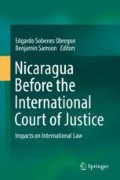Abstract
The concept of sovereignty is fundamental to international law, but vague and essentially contested. It is more often inferred from its effects than directly addressed. The Nicaragua cases in the 1980s saw the concept used extensively, both by the United States (in the jurisdiction phase) and by Nicaragua (on the merits). The International Court linked the concepts of ‘respect for State sovereignty’, sovereign equality, non-intervention and the prohibition on the use of force, but seems to have regarded sovereignty as an axiomatic principle, bound to the notion of the ‘personality’ of a State.
Vaughan Lowe is part of the legal team representing the Republic of Nicaragua in the following cases: Territorial and Maritime Dispute (Nicaragua v. Colombia); Question of the Delimitation of the Continental Shelf between Nicaragua and Colombia (Nicaragua v. Colombia); Alleged Violations of Sovereign Rights and Maritime Spaces in the Caribbean Sea (Nicaragua v. Colombia); Delimitation in the Caribbean Sea and the Pacific Ocean (Costa Rica v. Nicaragua) and Land Boundary in the Northern Part of Isla Portillos (Costa Rica v. Nicaragua). The views and opinions expressed in this Chapter are those of the author and do not necessarily reflect the views and opinions of the Republic of Nicaragua.
Access this chapter
Tax calculation will be finalised at checkout
Purchases are for personal use only
Notes
- 1.
Military and Paramilitary Activities in and Against Nicaragua (Nicaragua v. United States of America) Judgment, ICJ Reports 1986, p. 133, para 263 (hereinafter ‘Nicaragua v. United States (Merits)’).
- 2.
Island of Palmas case (Netherlands / USA), Award, 4 April 1928, RIAA, Vol. II, p. 838.
- 3.
- 4.
I am probably not alone in seeing in recent State practice in relation to Syria, Libya and other States a rather more flexible notion of respect for sovereignty than has been the case in the past.
- 5.
See, e.g., Ronzitti (1985), pp. 175–176.
- 6.
See, e.g., Beard (2001), p. 559.
- 7.
In addition to the examples given here, see e.g.: UNGA Res. 1803 (XVII), on Permanent Sovereignty over Natural Resources (1962); UNGA Res. 2131 (XX), Declaration on the Inadmissibility of Intervention in the Domestic Affairs of States and the Protection of Their Independence and Sovereignty (1965); UNGA Res. 50/172, Respect for the principles of respect for national sovereignty and non-interference in the internal affairs of States in their electoral processes (1996).
- 8.
Though sovereign equality is mentioned again in Article 78 of the Charter.
- 9.
Quoted in Simma et al. (3rd ed. 2012), pp. 145–146. This text gives an excellent account of the drafting of Article 2 of the Charter.
- 10.
Military and Paramilitary Activities in and Against Nicaragua (Nicaragua v. United States of America), Preliminary Objections, Judgment, ICJ Reports 1984, p. 417, para 55 (hereinafter ‘Nicaragua v. United States (Jurisdiction)’).
- 11.
Nicaragua v. United States (Jurisdiction), pp. 418–420, paras 59-63.
- 12.
Application of the Republic of Nicaragua, 9 April 1984, para 26.
- 13.
ICJ Pleadings, Case concerning Military and Paramilitary Activities in and Against Nicaragua (Nicaragua v. United States of America), Vol. V, p. 225.
- 14.
Ibid.
- 15.
Application of the Republic of Nicaragua, 25 July 1986, paragraph 16. The ICJ website gives the date of the Application as 28 July 1986. The document itself is dated 25 July 1986.
- 16.
Application of the Republic of Nicaragua, 25 July 1986, ICJ Pleadings, Case concerning Border and Transborder Armed Actions (Nicaragua v. Honduras). Again, the ICJ website gives the date of the Application as 28 July 1986. The document itself is dated 25 July 1986.
- 17.
See, e.g., Nicaragua v. Costa Rica, Memorial of Nicaragua, 10 August 1987, chs III, IV, VI; Memorial of Nicaragua (Merits), 30 April 1985, ICJ Pleadings, Case concerning Military and Paramilitary Activities In and Against Nicaragua (Nicaragua v. United States of America), Vol. IV, ch VII.
- 18.
Nicaragua v. United States (Merits), p. 106, para 202.
- 19.
Nicaragua v. United States (Merits), p. 111, para 212. Article 2(1) of the UN Charter states ‘[t]he Organization is based on the principle of the sovereign equality of all its Members.’
- 20.
Ibid., pp. 118–123, paras 227-238.
- 21.
Ibid., pp. 123–127, paras 239-249.
- 22.
Ibid., pp. 127–129, paras 250-253.
- 23.
Ibid., p. 128, para 250.
- 24.
Ibid., para 251.
- 25.
Ibid., para 250.
- 26.
Ibid., p. 129, para 253.
- 27.
Ibid., p. 130, para 257.
- 28.
Ibid., pp. 132–133, paras 261-262.
- 29.
Ibid., p. 133, para 263.
- 30.
Ibid., p. 134, para 266.
- 31.
Ibid., p. 133, para 265.
- 32.
Ibid., p. 135, para 269.
- 33.
Ibid., p. 111, para 213.
References
Beard JM (2001) America’s new war on terror: the case for self-defense under international law. Harv J Law Public Policy 25:559–590
Besson S (2004) Sovereignty in conflict. EIoP 8(15):1–50
Gallie WB (1956) Essentially contested concepts. Proc Aristotelian Soc 56:167–198
Lowe V (2008) Sovereignty and international economic law. In: Shan W, Simons P, Singh D (eds) Redefining sovereignty in international economic law. Bloomsbury, pp 77–84
Ronzitti N (1985) Rescuing nationals abroad through military coercion and intervention on grounds of humanity, Martinus Nijhoff
Sarooshi D (2004) The essentially contested nature of the concept of sovereignty. Mich JIL 25:1107–1139
Simma B et al (2012) The Charter of the United Nation. A commentary, vol 1, 3rd edn. Oxford
Author information
Authors and Affiliations
Corresponding author
Editor information
Editors and Affiliations
Rights and permissions
Copyright information
© 2018 Springer International Publishing AG
About this chapter
Cite this chapter
Lowe, V. (2018). Customary Principle of Sovereignty of States in the Nicaragua Case. In: Sobenes Obregon, E., Samson, B. (eds) Nicaragua Before the International Court of Justice. Springer, Cham. https://doi.org/10.1007/978-3-319-62962-9_11
Download citation
DOI: https://doi.org/10.1007/978-3-319-62962-9_11
Published:
Publisher Name: Springer, Cham
Print ISBN: 978-3-319-62961-2
Online ISBN: 978-3-319-62962-9
eBook Packages: Law and CriminologyLaw and Criminology (R0)

